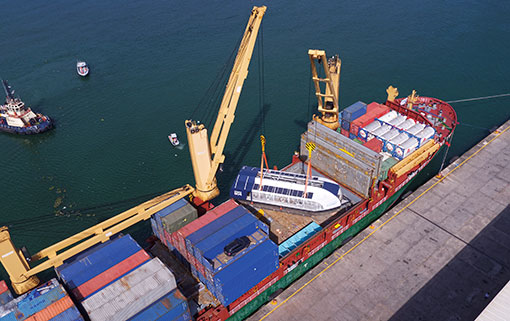Environment
The Ocean Cleanup Part two
Following a feature in Caribbean Maritime (issue 39), it’s time to provide a further update in regard to the installation of The Ocean Cleanup’s new Interceptor garbage collection barge in the Dominican Republic - the first of its kind in the region.
After transportation from Rotterdam in late February by Nirint Shipping’s 17,000 dwt multipurpose vessel Augusta Luna, The Ocean Cleanup’s Interceptor 004 was unloaded in Santo Domingo in early March. Nirint had fixed the cargo via Amsterdam’s We Ship Yachts and NEPA Shipping, also based in the Netherlands.
Interceptor 004 was planned for transfer to its location in the highly polluted Rio Ozama in the same month, but in line with many other aspects of global human activity the impact of coronavirus initially postponed its installation. As the Ocean Cleanup says: “Health and safety comes first, so this (delay) was the wisest decision. And, although this matter is slowing down activity all over the world, we are continuing our work towards our mission.”
Millions of tons
The Netherlands-based charity aims to clean up 90 per cent of ocean plastic pollution and says that every year millions of tons of plastic enter the oceans, of which the majority spills out from rivers. A portion of this plastic travels to ocean garbage patches, getting caught in a vortex of circulating currents. If no action is taken, the plastic will increasingly impact our ecosystems, health and economies.

The Ocean Cleanup adds: “Rivers are the main source of ocean plastic pollution. They are the arteries that carry waste from land to the ocean. Our research found that around 1,000 rivers are responsible for roughly 80 per cent of the pollution.” The charity aims to install inceptors in all of these 1,000 or so rivers by 2025 and the Rio Ozama was the first in the Caribbean and only the fourth worldwide. The first was installed in Jakarta and a second in Kuala Lumpur.
Scalable
The Interceptor is The Ocean Cleanup’s answer to river plastic waste. It is the first scalable solution to prevent plastic from entering the world’s oceans from rivers. It is 100 per cent solar-powered, extracts plastic autonomously and is capable of operating in the majority of the world’s most polluting rivers. Interceptors can extract 50,000 kg of plastic per day. In highly optimal conditions, up to double this amount can be achieved. The Interceptor can continue extracting debris even when the dumpsters are being emptied.
Jamaican deployment
Thanks to US$1 million award from California’s Benioff Ocean Initiative, The Ocean Cleanup will also be deploying an Interceptor in Jamaica's most polluting waterway which is responsible for an estimated 578,000 kg of plastic entering the ocean each year.
The instalment of the Interceptor will be in collaboration with local charity Recycling Partners of Jamaica.
The Ocean Cleanup Interceptor will be deployed at Hunts Bay in the heart of Kingston Harbour – the world’s seventh largest. Plastics collected will be separated at collection centers in Kingston and recycled where possible, and with the participation of the community, and where changes are expected both in local behavior and a measurable reduction in plastics reaching the Caribbean Sea.










